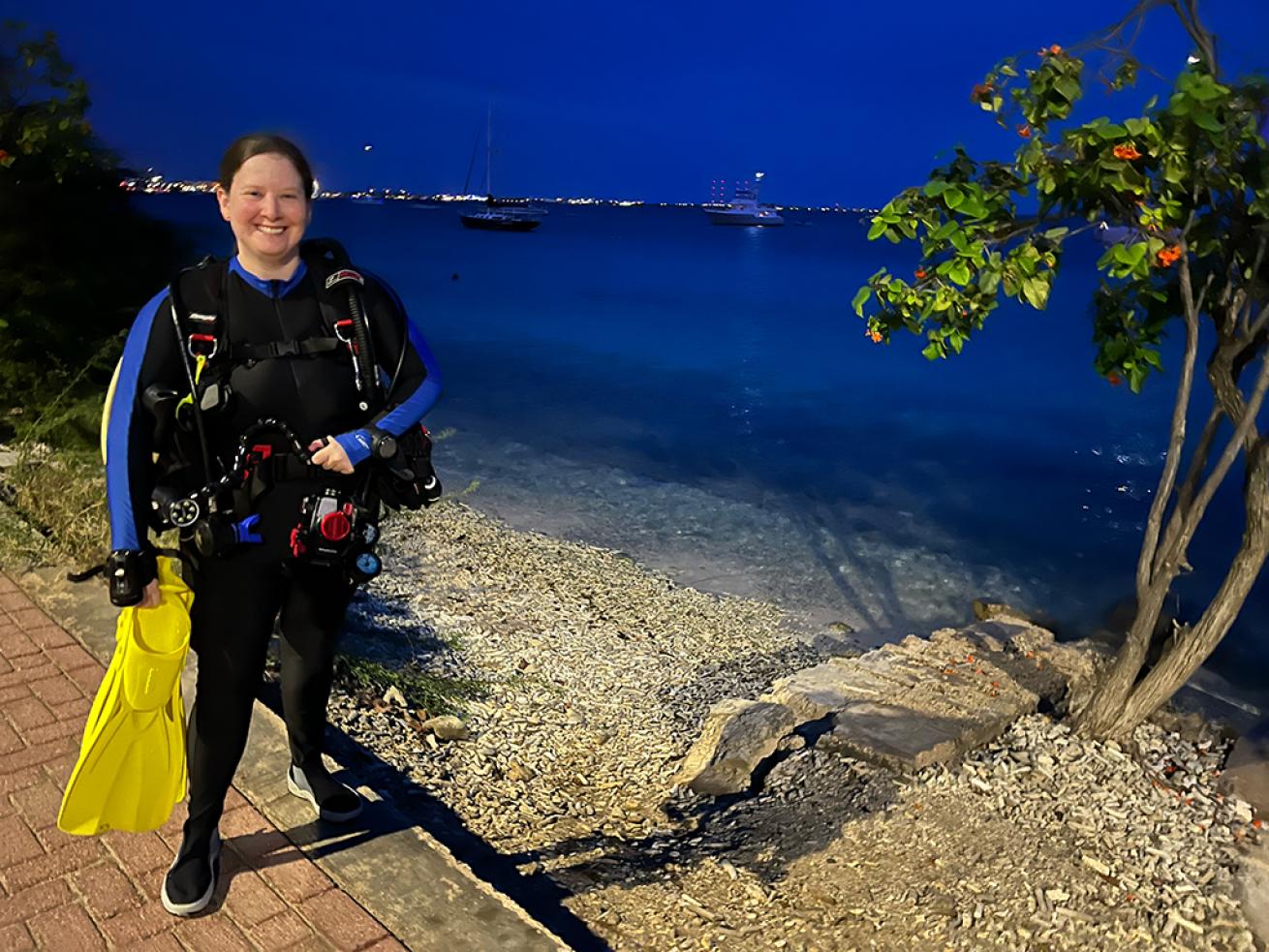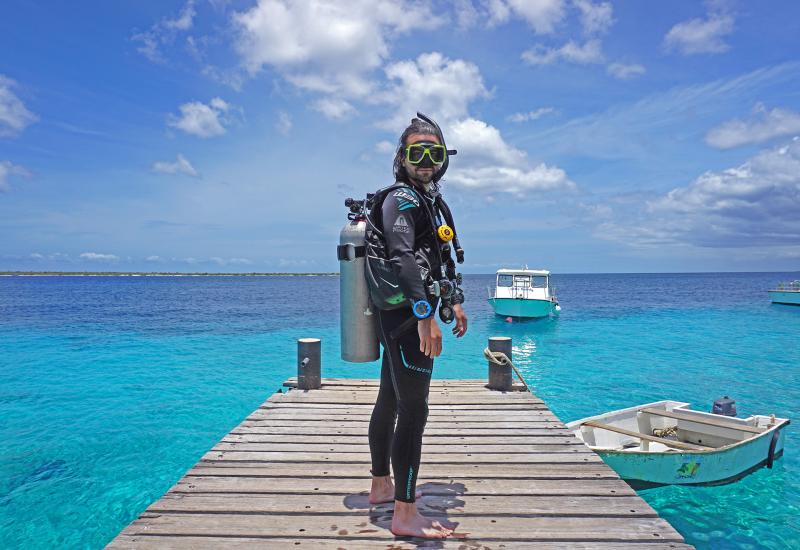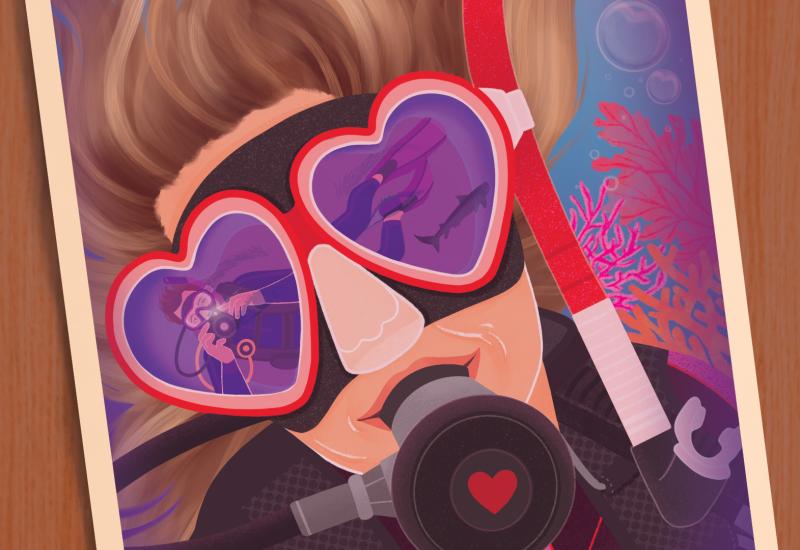How to Conquer Your Fear of Night Diving

Alexandra OwensThe author preparing for a night dive in Bonaire
I have a confession to make: I’m terrified of the ocean at night. As much as I love observing the underwater world and all the animals in it, the inky darkness beyond my dive light haunts me, as all-consuming as my anxiety itself. What I don’t see will surely hurt me, right?
As a scuba diver who spends the equivalent of multiple days underwater each year, I know my fear is irrational. I also know what I’ve been missing out on. Night diving reveals a mysterious, hidden menagerie of nocturnal and shy creatures that come to life when the sun goes down. Lobsters, eels and octopuses all become more active as they hunt, and coral polyps open up to feed.
“You can find fish behaving like humans aren’t watching,” says Hens Silva, founder of Xprodiver Bonaire. “It’s like going to a party with your work friends—they behave completely differently than they do at the office.”
Related Reading: Fiji After Dark: One Diver’s Journey Into Night Diving
Alexandra OwensA slipper lobster spotted at Something Special under the cover of darkness
Conquering Fears in Bonaire
That’s why, during a recent trip to Bonaire, I decided to finally face what scares me. World renowned for its easy shore dives and a healthy fringing reef that’s, on average, less than 30 feet from the coast, the laidback Caribbean island makes the perfect destination for a jittery night diver like me. In Bonaire, you can simply park your car, wade into the ocean and swim back to shore.
At least that’s what I keep repeating to myself as Silva and I geared up next to Salt Pier around 7 o’clock one evening. As we kick out to the site, my mind begins to play tricks on me; my chest tightens. Once we descend though, my training—and perhaps my curiosity—take hold as my breath deepens. We spot a wriggling soapfish looking for prey, massive lobsters on the move and a basket star extending its arms into the current. By the time we reach Something Special, I barely flinch when five-foot tarpons whip past me, hoping to take advantage of smaller fish illuminated by our dive lights.
This is diving as I know and love it, and in some ways, to my surprise, even better. With my vision limited to my dive light, I’m not tempted to keep my head on a pivot in search of the next best thing. Night diving encourages me to focus and appreciate small wonders and mysteries I would typically pass by, from the slightest movement of a sea cucumber to delicate sea pearl algae.
Related Reading: In the Dark | Lessons for Life
Alexandra OwensA fireworm crawls across the ocean floor at Something Special at night
A Night to Remember
Now, I’m already making plans to return to Bonaire to see the famous bioluminescent ostrocods dive which occurs every month a few days after the full moon, and I can’t wait to see what other unique night diving experiences I’ll discover around the world.
Still nervous? Here are a few tips to help you embrace the darkness.
Take a Night Diver Course
During the PADI Night Diver course, I practiced signaling with my dive light, brushed up on my navigation skills, learned what nocturnal creatures to look for, and more. Knowing what to expect on my first dive and having an instructor by my side helped me relax, and gave me confidence to explore the ocean in a new way.
Alexandra OwensA large spiny lobster peeks out of the reef near the Salt Pier
Give Shore Diving a Chance
Night dives from the shore can feel way less nerve-racking than giant striding off a boat in the open ocean. And no wonder—shore dives tend to be on shallower reefs and easier to navigate. There’s also something comforting about knowing land is a quick swim away.
Time Your Dive Carefully
Planning your dive for sunset allows you to ease into the water before it becomes pitch black. It’s also a fascinating time to be in the ocean. Timed properly, you get to see the reef as it transitions into twilight.
Related Reading: Do Sharks Behave Differently at Night?
Stick to Your Buddy
If you have a tendency to wander off during a dive (sheepishly raises hand) night diving is a great opportunity to reform that habit. Bonus for nervous divers: The more people you’re with, the more light you’ll have—so make it a party. Just remember that too much light will disturb marine life.
Dive Somewhere Familiar
“Before going night diving, it is always a good idea to dive the site during the day to familiarize yourself with its entry and exit point, landmarks, and other conditions,” says Silva. This makes navigation easier and reduces anxiety; it’s also a lot of fun to see how a site becomes a new world after sunset.










